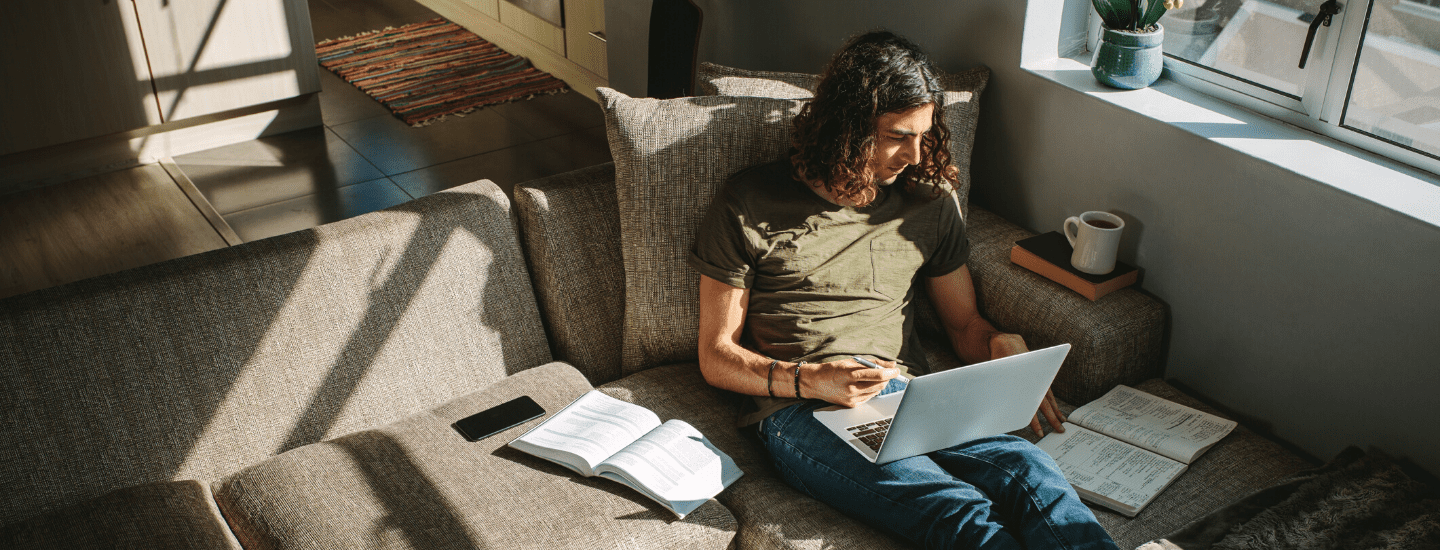News flash! Host Shortlisted for Three Prestigious GSL (Global Student Living) Awards 2025 and Retains Platinum Operator Certification
We've still got a couple of rooms left! ROOMS SELLING FAST - BOOK NOW

Easter has been and gone and this Friday sees the fourth Bank Holiday of 2020; can’t we transfer them all to later in the year, so we actually get to enjoy them? But before another Bank Holiday hits, what better time to sit down and ask yourself what’s the best way to keep up my studying?
For most students, lectures moved online at the end of March. No doubt for most of you that means sitting up in bed, laptop / iPad in hand with Netflix on in the background. However, that’s not going to be the most productive way of staying focused on the topic at hand.
So, to help you, we’ve come up with a few ways you can study effectively at home.

If you’re still living with Host at one of our locations throughout the UK, you’re in luck as all our bedrooms come with a study space to keep you focused and motivated during these times. But if like the many thousands of students across the UK you headed back to the family home, you’ll need to create a study space.
And unfortunately, if Mum and Dad are working from home or you have siblings living at home, you’ll probably be competing with others for the premium working space. Try and mark out a personal workspace where you can get on with your studying, undisturbed.
The Open University recommends that you set boundaries with others at home. If your study space is now the kitchen table, set an agreement that it is yours alone for a set time. Try to place some physical objects around you to section it off and make it comfortable.

One of the most difficult things with a temporary workspace is keeping it tidy.
Studying at home is difficult. It’s hard to be disciplined at home when there are so many distractions; Netflix, the fridge, the garden, the fridge, what the family are up to, the fridge. And it’s even harder when your study area is cluttered.
Consider spending 10 minutes before starting to study to blitz the area. This will make a calmer environment to focus and get through your to-do list.

Divide your to-do list into manageable time slots and make sure you take proper breaks. You need to remember that different tasks require different levels of concentration. Watching a video will be a hell of a lot easier than reading a complex textbook. Or staying focused for a recorded or live streamed lecture that’ll require you to take notes. We’ve previously blogged about being productive.

One of the most dangerous things about studying at home is when the “I’ll do that later” thought enters your head. Stop putting off watching that economic lecture. Devote your full attention to the recording and don’t think you can just squeeze it in between a Netflix binge-watch. Check out this blog about planning your day.
And you don’t have to stick to the 9-5 if that doesn’t work for you. Identify the times when you are most productive and centre your day around that. Remember to take regular breaks, it’ll keep your mind fresh and prevent burnout. Step away from the laptop every hour or so and do something you enjoy, read a book, watch a bit of TV, or play a game. If you’re able to, go for a walk once a day and give yourself things to look forward to each day. It’s also important to set yourself a clear cut-off point when you will finish studying for the day. If possible, pack up your studying materials. That way you can relax in the evening without it staring you in the face.

You’re going to be missing the campus life and socialising in person but reach out to your uni friends. Make use of the technology available to you; WhatsApp, Messenger, FaceTime, Zoom, House Party. Use whatever means necessary to keep in touch. Think about holding study groups to discuss assignments, share resources, study tips and revise together.
For a few helpful tips look at our blog on what to do if you’re stuck on an assignment.

While you won’t be able to pop into their office between lectures, keep in touch with them regularly. An email once a week or a video call to keep in the loop. This way you’ll learn of any developments on your course, reading lists, lecture notes, the list is endless. Remember, keeping in contact with lecturers and tutors is so important if you’re in the latter years of your course with final exams and deadlines rapidly coming up.
While you’re studying at home, you may not have access to all the tools you need. For example, if you don’t have a reliable internet or Wi-Fi connection, you could eat up your mobile data to connect to online lessons. There are also the physical resources such as the library and laboratories that everyone will be missing. For issues like this talk to the university as they may be able to help.
If you are feeling anxious or stressed, speak to your tutor as they could help to ease those concerns. But remember like you and the rest of the world, your lecturers are probably under pressure to keep delivering your courses online, so be patient and give them time to get back to you.
How are you coping with studying at home? Let us know on our Facebook page.
To become more ‘environmentally friendly’, Host is launching the #HostEnvironmentalPledge campaign to encourage responsible behaviour and drive sustainability across our sites throughout the UK and Ireland.
It’s a simple campaign! For every percent we reduce our overall utilities (electric, water and gas) consumption by we donate to one of our nominated charities.
Show me all newsAs the academic year winds down, many students start packing their bags and heading home for a much-needed break. But what if you stayed in your university town or city instead? Picking up a summer job where you study can be a game-changer - not just for your bank balance, but also for your personal growth and career prospects. Here's why staying local this summer might be one of your smartest moves yet, along with practical tips to make the most of it.
Choosing where to live during your studies in London is about more than just finding a place to sleep - it’s about finding a supportive, safe, and enriching environment that enhances your university experience. Here's why thousands of students choose Host as their student accommodation provider in London every year.



